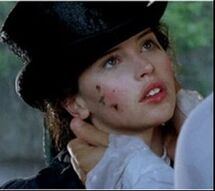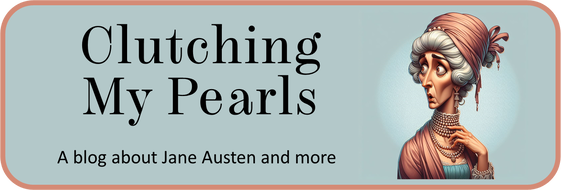| This blog explores social attitudes in Jane Austen's time, discusses her novels, reviews forgotten 18th century novels, and throws some occasional shade at the modern academy. The introductory post is here. My "six simple questions for academics" post is here. |
 Felicity Jones as Catherine Morland, engrossed in a mysterious gothic
Felicity Jones as Catherine Morland, engrossed in a mysterious gothic Page after page of characters stammering out incoherent remarks (dashes and dots in the original):
- “Thy looks! –I feel them, --they will d---n me yet!”)
- “I cannot pray! –I will not—no—Hell is but reprobation—that is mine already—or will be soon --- ---- ---- --- --- Yet, --but him [Mr. Winstanley, that is] I now hate—I know him,--he knows not me,---no, nor my deeds.—One effort yet, to cool this burning fever, to ease this secret torture, --this---this—Oh, Mortimore! –Mortimore!—Thee!—this—and if I fail! –be they blasted in all hope, --and I!—dark perdition cover me for ever—ever--!”
- “Why Mrs. Courtney uttered such a frantic shriek, or what caused such violent emotion, the reader is left to imagine…”
- “the secrets of another are not my own.”
- "I have already told you... that I never mean to marry."
- "With these incoherent and inexplicable words, he rushed with frantic impetuousity from their presence.”
And holy snapping turtles, this had some lurid stuff; at least, lurid compared to the decorous voice of Jane Austen. This has several same-sex teases, and an incest tease, and a ghost-who-turns-out-to-be not a ghost, adultery and seduction, along with forged letters and other skullduggery. Get your smelling salts out for this one.
Let's meet our main characters: a brother and sister team, Frederick and Ellen Mortimore. Frederick is empathetic, gentle, rational, and introverted and Ellen is ardent, impulsive, intelligent, and accomplished. They should arouse our sympathies because they have fallen on hard times, but it was challenging for me to stay engaged when their motivations were withheld by the author, and through various hints we learn that they are not who they claim to be.
“Try to love you!” repeated Mortimore, with irrepressible emotion….“Still!” he repeated, his eyes wild, yet fixed with strange and piercing meaning on [Mrs. Winstanley]. She was dull,--she understood not the silent intellligence.” (Join the club, sister). |
 Balm? Sorry, you're on your own
Balm? Sorry, you're on your own Do I care that Winstanley is harboring a guilty secret? “Distraction!” he shrieked. “I am –I am undone! “…………….bear thy beloved image where passion can no more………. The virtues lingering in thy bosom…..” and “They are dead! –perished” cried he, starting, “I am not human! –What can I do? –Retreat! –Perdition! –What then? –Oh, thought! thought! thought! split not my burning brain!”
How could this book get worse? That’s right, poetry. There’s some poetry. And a ghost.
I’m introducing the spoilers early, to avoid going through the plot of the book twice: Mr. Winstanley changed his name from Fitzalvan when he left England with his mistress, erroneously thinking that his wife was in love with another. He abandoned Ceceline and his children without a word and he changed his name. The young man Frederick Mortimore turns out to be Ceceline in disguise, and Ellen Mortimore is really his son Arthur. They cross-dress throughout the story, so the author can give us scenes like the lovely young Antonia Courtney declaring her love for Ellen:
 Image generated by Bing AI
Image generated by Bing AI “I shall run wild—distracted!”
“Run wild!” repeated she, “let us run any where, so as it is together.—to leave me now, now when I have learned to love you, learned to be almost like you—”
“In pity say no more, Antonia,” interrupted Ellen, her cheeks in a conscious glow, “I cannot bear it.”
“Promise me then to stay with me,” [Antonia pleads, asking Ellen not to take a governess job she’s been offered, fearing that her employer will fall in love with her], you will marry him, and then—”
“Marry him!” cried Ellen, interrupting her, “no, Antonia, I will never marry anyone that would divide me from you,--do not fear,--do not think it.”
We have Mr. Winstanley trying to proposition Ellen, unaware that he’s hitting on his own son. We have his mistress Harriet making a play for Frederick, unaware that it’s her old best friend Ceceline who she betrayed.
 "Frederick" finds "Ceceline's" wedding ring. Bing AI generated image.
"Frederick" finds "Ceceline's" wedding ring. Bing AI generated image. Mr. Winstanley survives the fever, thanks to Ceceline, but she catches it and her true identity is unmasked on her death bed with more incoherent stammering; “Oh, mourn not me! –look—your son, as Ellen, he sustained—watched his mother! –Now—now—my latest—only love, I die—dying for you! –Oh, happy—happy!—Your children--- --- my --- --- --- --- --- my god! –my Fitzavern!”
Ceceline’s death is fatal for her husband: “He made one essay to speak, but this lips only moved, and the words choaked him! He raised Ceceline’s head to his bosom—folded the cold corse within his arms—and with one—only one groan—it was his last—he sunk—he was gone—he never breathed again—and Fitzavern was with Ceceline!!! ___ ___ ___ ___ ___ ___ ___ ___ ___ ___ ___ ___ ___ ___ ___ ___
Mr. Winstanley did become a bigamist when he married the rich widow. But instead of going to the minister and preventing this crime from occurring, Ceceline dressed herself up as a ghost (as one does) and appeared before him, futilely warning him not to marry.
The marriage didn’t prosper anyway, because the rich widow’s: “long unrestrained passions, voluptuous living, and high pampered appetites, had left her vitiated mind only fit for the vilest gratifications; and as they ill suited the natural delicacy of Winstanley’s taste,” she paid for a gigolo.
So really, in this novel, people do senseless things and it turns out they accomplish nothing. Except for the deceitful mistress Harriet, I suppose. She succeeded in luring Winstanley/Fitzavern away from Ceceline by forging a letter. She comes to a miserable end, though, we are told.
 Gothic titillation and confusing clues. Image generated by Bing AI.
Gothic titillation and confusing clues. Image generated by Bing AI. I wonder if the young ladies poring over this tale had any notion what “the vilest gratifications” and the "degrading passions" of the rich widow might be. Or how did they interpret "irresistible nature" and "broke forth" in this passage: "The young and interesting Antonia hanging with easy, innocent fondness on his bosom… proved too much for the high and ardent spirits of…. Arthur Fitzavern; --nature, irresistible nature broke forth, and without either motion or speech betraying, Mrs. Courtney penetrated the secret.”
Hopefully the female readers spent more time pondering the double standard the author upholds between male and female conduct. But more than that, I wonder: did the early readers of this book recollect every previously-inexplicable detail that had gone before the Big Reveal, and did they say to themselves, aha, so when Frederick/Ceceline turned pale and rushed away when Harriet Winstanley arrived at Mrs. Courtney’s, it’s because she recognized her old-backstabbing friend. Or, did they turn back to volume one to re-skim all those passages which made no sense before?
Jane Austen is not the first to string clues and hints throughout her tale, but we can read and re-read Emma with pleasure, finding some new nuance to savor every time. Austen can withhold information from us and still create a coherent and interesting story that doesn't rely on salacious details to keep us turning the pages.
The other aspect of this book which might be of interest is the matter-of-fact portrayal of enslavement in Barbados. No amount of academic detachment is going to prepare you for certain words strung together in a certain way, such as: Mrs. Courtney’s “slaves were numerous, and it was her pleasure to let them live happily. Her plantations were extensive, and they not only sheltered and supplied the sable inhabitants in her service, but also gave employment and independence to many Europeans and their families.”
As well it's jarring, to say the least, to see Winstanley, a plantation-owner, speak blithely to the rich widow about love, slaves and chains:
“Thou art a dear provoking wretch, Winstanley,” [says the widow flirtatiously]
“I would provoke you,” kissing her hand, “to make me a willing slave for life. –How I should glory in my chains!”
“They shall hang easy on you,” cried the lady, “do not fear them—”
“Fear them!” interrupted he, “I die,--I languish for them!”
These passages, and others, tell us that although abolition had been hotly debated, you could still encounter a variety of opinions in the novels of the day, from vehement abolitionism to casual acceptance of enslavement. Whichever side you were on, there was no need to use veiled allusions.

Isabella Kelly (1759–1857) was a prolific authoress, chiefly of Gothic novels, who supported her children after her two marriages did not prosper. She lived in poverty most of her life. She lived to the age of 98, calling herself the last surviving novelist of her era. In A Modern Incident, she worked in some lavish praise of the successful author Matthew “Monk” Lewis, “one whose nature reflects honour on the human kind,” because he had been helping one of her sons find work. James Fordyce, of Fordyce’s Sermons, was her uncle.
Scholar Yael Shapiro points out that Kelly focused on marital troubles in her novels, as opposed to ending her books with weddings: “Where [Gothic best-seller Ann] Radcliffe sets up a sharp dichotomy between good and bad marriages, Kelly’s novels seem to accept men’s controlling behavior as a possible part of any marriage.”
| Rachel Feder, in a new book about Jane Austen and cultural tropes (of which much more in future) points out “Gothic novels… simultaneously offered an escape from and a commentary on the real world, which has always been dangerous for women [the real world, that is]. [T]hese stories were often subversive but not particularly progressive.” That's certainly my take on A Modern Incident." We have some subversive fun with some same-sex and incest teases, (if that's your idea of fun), then the author winds up her tale with more double-standard morality:
|
Previous post: Innocent Ellen, a gothic heroine Next post: Emily, the likeable heroine


 RSS Feed
RSS Feed